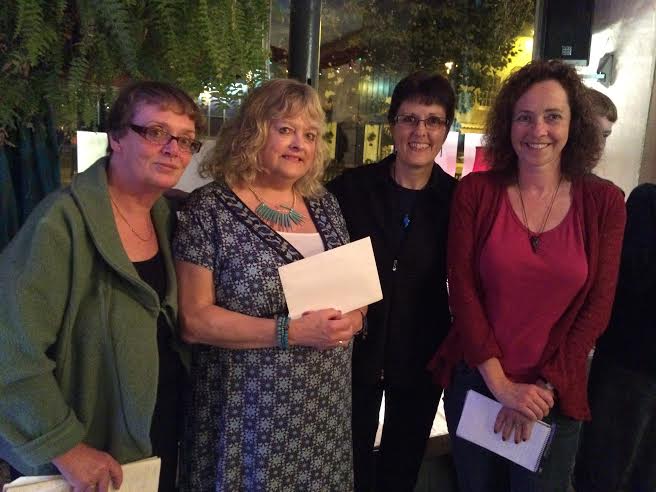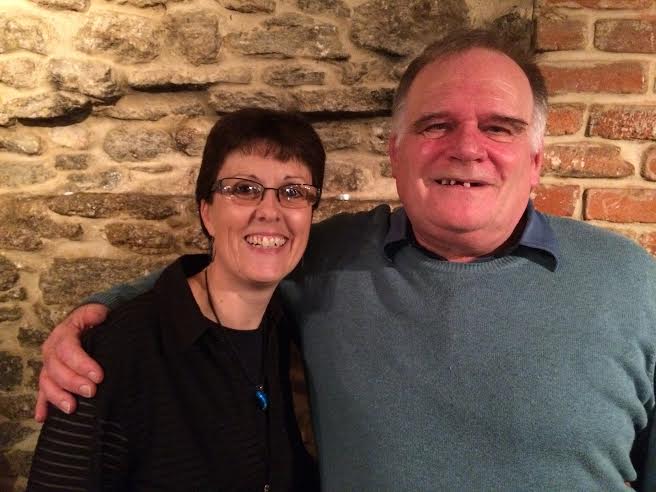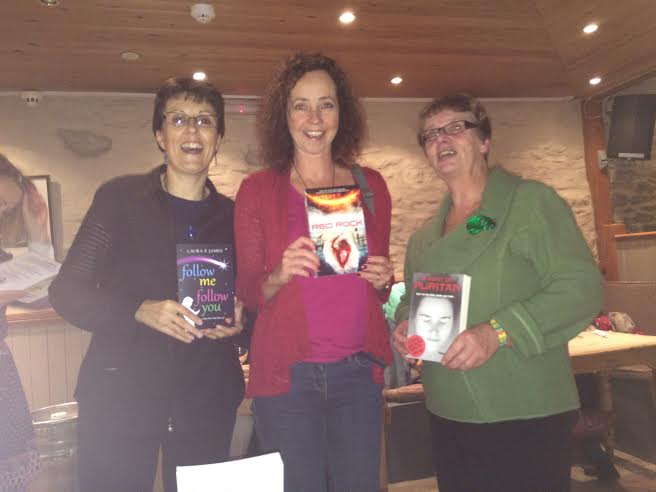Here’s the scene: an old pub/coffee house that winds backwards and upwards (beware the stairs!) with a wood burning stove and wooden floors and tables (presently pushed to the side) and rows of chairs with settles against the available wall space, all full of people laughing and talking until one of them walks up to the microphone squeezed into the front window and begins to read.
Judging a short story competition doesn’t take a fraction of the nerve it takes to stand up in front of an audience, many of whom know you, and read your story aloud – especially when three judges are sitting under your nose and making notes and trying to look inscrutable. I had the fun job, I decided, watching the tremor in more than one entrant’s hands.
When I was approached to help with the judging of the third Bridport Story Slam I had to ask, ‘What is a Story Slam?’. It’s an exercise in insanity where people agree to stand up and read our their work. Time allowed: five minutes only. After that, the alarm (kitchen timer in this case) goes off and you have to stop mid-sentence. Our entrants were extraordinarily well organised. To one or two murmurs of disappointment, (Shame!) no one was cut off, although one woman ended her story to the sound of the buzzer on the last word. Cue rueful laughter.
The range of stories was wide: comedy, anecdote, a sweet tale of an old lady at Christmas, a poignant glimpse into a childhood in care, an uproarious Irish childhood, local traditions brought to life, dread in the peaceful suburbs. I was glad there were three of us judging. Kate Kelly (http://scribblingseaserpent.blogspot.co.uk/2014/10/bridport-story-slam-iii.html) and Laura James (http://www.lauraejames.co.uk/?p=2621) and I had much to discuss after we had listened to all 12 entrants.
Choosing the top three did, eventually, prove possible, although there was some lively discussion about the order. In the end we all agreed that Wendy Breckon’s funny and lively story, A French Tale, was our winner. This story of a girl (‘Seven, not quite eight’) in rural Ireland trying to find out what her Grandma’s French phrase (Voulez vous couchez avec moi?) meant was more than a comic tale of naïve misunderstanding. What made it a winner was the effortless evocation of place and character. The Grandfa, ‘skinning a rabbit for supper’, who came in ‘smelling of cow manure and wet grass’ and the Grandma who clearly had had a lively youth were evoked through the child’s innocent perception and Wendy showed us the relationships between all three characters without once having to tell us what was happening. The voice in this story was remarkable, and well-sustained. The performance of the author – because, in a Slam, the telling carries a lot of the weight of the tale – was outstanding.
Comedy tends to be squeezed out when ‘literature’ is being discussed. It was therefore a delight to be able to award second prize to Richard Green’s outrageous and uproarious story (Health and Safety, I Presume). His performance as the old-fashioned army ‘buffer’ who has murdered his wife and left her body with a tidy neighbour who promptly returned the corpse to its proper place (the killer’s wheelie bin, where else?). Was a tour de force. Somehow it was just so right to realise that we had Colonel Mustard (with the candlestick) telling us his side of the story. We asked ourselves, ‘Is he like that in real life?’ only to meet Richard later and realise how wrong we were.
Just squeezed into third place was Gill Smith’s Hide & Seek. This story had a deceptively ordinary suburban setting where ‘Bill was at the bridge club’ and the narrator watched the neighbour’s children play outside or run to the Wendy house. The use of pacing and foreshadowing, however, built the atmosphere of suspense until we knew something terrible was about to happen but didn’t know what. That the final revelation let us down a little, was what made this story slip into third place but the author is to be congratulated on her ability to create and sustain mounting tension.
It was a great evening and I felt privileged to have been invited to share in the judging.
I have to finish with thanks to Frances Colville who organised the event (she’s been asked to do another next spring, go to www.Dorsetwritersnetwork.co.uk in the new year for details), especially since she has generously donated all the profits from a really excellent evening to Words for the Wounded a charity which raises funds through writing to support wounded service personnel. Next year’s competitions open on November 11th, so check out the website (www.wordsforthewounded.co.uk) for details.



